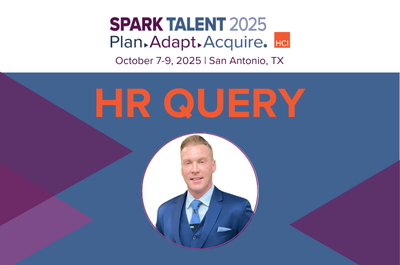AI has nestled itself into the foundation of today’s workplace, but despite its capabilities and resources, few are seeing any real benefit from it. For most businesses, AI is the new, shiny toy being used any and everywhere in hopes it makes a difference. But, like any other tool, if not used intentionally, with concrete strategy behind it, AI won’t bring the changes you’re seeking.
So, how do you integrate AI in a way that’s both effective and efficient? According to Ross Sparkman, Head of Workforce Planning for Nutrien, it’s a balancing act. “How do we truly transform our workforces and our organizations in a way that we are working side by side with this technology, and we don’t lose touch with the human and the cultural piece,” he says.
Sparkman is set to speak at SPARK Talent 2025, where he’ll be presenting on several resources and strategies HR professionals need to know if they’re going to properly adopt AI agents and get ahead in the future of workplace strategy.
But before his talk, HR Daily Advisor got to chat with him on what he thinks the future of an agentic AI workforce looks like, and how to start preparing for it. Here are the 3 biggest takeaways we got from our conversation!
Before the AI Agent, You Need AI Strategy
The goal of AI is to take out the non-value add activities from an employee’s day-to-day. The more busy-work an AI agent handles, the more time employees have to create, have meaningful conversations and participate in meetings. But, when attempting to make that change at every single level, things are bound to get messy.
“That’s where you have to actually have an AI strategy as enterprise level,” Sparkman says. “So right from the start, you need to establish and be aligned at the board and the C-suite level. Ask, ‘what is our objective with AI?’ Are we just going to become more productive as an organization? Are we actually going to grow the size of the workforce? Are we going to grow it in different parts with these different skills that focus more on leveraging or capitalizing on AI?”
Like you would before implementing any kind of change, HR professionals need to be asking these questions and getting answers from the C-suite and board level before acting.
“Once you start to do that, you’re able to then really develop kind of what I would call your AI strategy—how you’re going to use the technology,” he says.
In The AI World, You Need Fluency, And Empathy
With AI taking over certain roles and responsibilities, the skills needed to be the best at one’s job are evolving just as fast. For a clearer look at the future, we asked Sparkman what skill he thinks is going to be the most valuable in the future. To him, it’s the ability to simply understand, and adapt to these changes that’s going to be key moving forward.
“The primary skill is going to be AI fluency,” Sparkman says. “It’s the ability to prompt engineer. If you want to keep up with the folks that are power users, and as the technology becomes more and more prevalent—you’re just going to have to really get good at this.”
Being fluent in AI is going to be key in standing out among the pack, but staying on top of the future is going to be a “two-pronged approach,” as Sparkman says.
“There are things that are still very human: emotional intelligence, the ability to influence, communication skills, logical thinking, critical thinking—we need that AI fluency, but at the same time we really need to double down on the soft skills, because they’re going to become more important than ever.”
Urgency Is Key, But Don’t Rush
The future is fast approaching, and it seems to only be getting faster. What was speculative about AI just months ago is now real, and it will only continue to grow and adapt. While no decision should be made in a rush or panic, decisions on how HR professionals will move forward with AI do need to be made.
“The technology continues to move forward. We need to move fast, obviously, as organizations, but we also need to ensure that we are taking the time to take a strategic approach,” Sparkman says.
“It has to be very intentional—not moving too fast, while at the same time moving with a sense of urgency. Things are changing fast and there has to be a balance between doing things correctly, but not becoming complacent and being left behind.”
Complacency has always been cause for concern, leading businesses to stagnate and be left behind. Now, more than ever, you need to be proactive to address the shifting world of the workforce, and HR teams need to be at the forefront, leading that change.
“HR has a big role in this work. This is not an IT problem. This is not a technology problem. When we talk about AI transformation, it’s cross-functional,” Sparkman says.
Preparing for the AI workforce is a complex web of upskilling, searching for the right people, and proactively and intentionally integrating technology into your workflows. As Sparkman explains, no team is better suited to lead that change than HR.
If you’re interested in hearing even more from Ross Sparkman, please join us live in San Antonio at SPARK TALENT 2025, October 7–9, 2025. You’ll also hear from other speakers from ADM, PepsiCo, GE Healthcare, Hyatt Hotels Corporation, The Coca-Cola Company, and more. Get practical strategies focusing on workplace planning, talent acquisition, and AI-driven processes, with plenty of opportunities for you to connect with the HR community.





